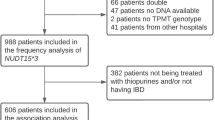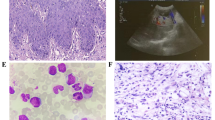Abstract
Irinotecan is an anti-neoplastic agent that is widely used for treating colorectal and lung cancers, but often causes toxicities such as severe myelosuppression and diarrhea. In this study, we performed a two-stage case–control association study for irinotecan-induced severe myelosuppression (grades 3 and 4). In the first stage, 23 patients who developed severe myelosuppression and 58 patients who did not develop any toxicity were examined for 170 single nucleotide polymorphisms (SNPs) in 14 genes involved in the metabolism and transport of irinotecan. A total of five SNPs were identified to show the possible association with severe myelosuppression (PFisher<0.01) and were further examined in 7 cases and 20 controls in the second stage of the study. An intronic SNP, rs2622604, in ABCG2 showed PFisher=0.0419 in the second stage and indicated a significant association with severe myelosuppression in the combined study (PFisher=0.000237; PCorrected=0.036). Although only limited subjects were investigated, our results suggested that a genetic polymorphism in ABCG2 might alter the transport activity for the drug and elevate the systemic circulation level of irinotecan, leading to severe myelosuppression.
Similar content being viewed by others
Log in or create a free account to read this content
Gain free access to this article, as well as selected content from this journal and more on nature.com
or
References
Pfizer. Full prescription information for Camptosar. Available from URL:http://www.pfizer.com/files/products/uspi_camptosar.pdf.
Rothenberg, M. L. Irinotecan (CPT-11): recent developments and future directions-colorectal cancer and beyond. The Oncologist 6, 66–80 (2001).
Vanhoefer, U., Harstrick, A., Achterrath, W., Cao, S., Seeber, S. & Rustum, Y. M. Irinotecan in the treatment of colorectal cancer: clinical overview. J. Clin. Oncol. 19, 1501–1518 (2001).
Mathijssen, R. H., Verweij, J., de Jonge, M. J., Nooter, K., Stoter, G. & Sparreboom, A. Impact of body-size measures on irinotecan clearance: alternative dosing recommendations. J. Clin. Oncol. 20, 81–87 (2002).
de Jong, F. A., de Jonge, M. J., Verweij, J. & Mathijssen, R. H. Role of pharmacogenetics in irinotecan therapy. Cancer Lett. 234, 90–106 (2006).
Chabot, G. G. Clinical pharmacokinetics of irinotecan. Clin. Pharmacokinet. 33, 245–259 (1997).
Cersosimo, R. J. Irinotecan: a new antineoplastic agent for the management of colorectal cancer. Ann. Pharmacother. 32, 1324–1333 (1998).
Canal, P., Gay, C., Dezeuze, A., Douillard, J. Y., Bugat, R., Brunet, R. et al. Pharmacokinetics and pharmacodynamics of irinotecan during a phase II clinical trial in colorectal cancer. Pharmacology and Molecular Mechanisms Group of the European Organization for Research and Treatment of Cancer. J. Clin. Oncol. 14, 2688–2695 (1996).
Saliba, F., Hagipantelli, R., Misset, J. L., Bastian, G., Vassal, G., Bonnay, M. et al. Pathophysiology and therapy of irinotecan-induced delayed-onset diarrhea in patients with advanced colorectal cancer: a prospective assessment. J. Clin. Oncol. 16, 2745–2751 (1998).
Michael, M., Brittain, M., Nagai, J., Feld, R., Hedley, D., Oza, A. et al. Phase II study of activated charcoal to prevent irinotecan-induced diarrhea. J. Clin. Oncol. 22, 4410–4417 (2004).
Han, J. Y., Lim, H. S., Yoo, Y. K., Shin, E. S., Park, Y. H., Lee, S. Y. et al. Associations of ABCB1, ABCC2, and ABCG2 polymorphisms with irinotecan-pharmacokinetics and clinical outcome in patients with advanced non-small cell lung cancer. Cancer 110, 138–147 (2007).
Rosner, G. L., Panetta, J. C., Innocenti, F. & Ratain, M. J. Pharmacogenetic pathway analysis of irinotecan. Clin. Pharmacol. Ther. 84, 393–402 (2008).
Kawato, Y., Aonuma, M., Hirota, Y., Kuga, H. & Sato, K. Intracellular roles of SN-38, a metabolite of the camptothecin derivative CPT-11, in the antitumor effect of CPT-11. Cancer Res. 51, 4187–4191 (1991).
Rivory, L. P., Riou, J., Haaz, M. C., Sable, S., Vuilhorgne, M., Commercon, A. et al. Identification and properties of a major plasma metabolite of Irinotecan (CPT-11) isolated from the plasma of patients. Cancer Res. 56, 1689–1694 (1996).
Dodds, H. M., Haaz, M. C., Riou, J. F., Robert, J. & Rivory, L. P. Identification of a new metabolite of CPT-11 (Irinotecan): pharmacological roperties andactivation to SN-38. J. Pharmacol. Exp. Ther. 286, 578–583 (1998).
Atsumi, R., Suzuki, W. & Hakusui, H. Identification of the metabolites of irinotecan, a new derivative of camptothecin, in rat bile and its biliary excretion. Xenobiotica 21, 1159–1169 (1991).
Lokiec, F., du Sorbier, B. M. & Sanderink, G. J. Irinotecan (CPT-11) metabolites in human bile and urine. Clin. Cancer Res. 2, 1943–1949 (1996).
Michael, M., Thompson, M., Hicks, R. J., Mitchell, P. L., Ellis, A., Milner, A. D. et al. Relationship of hepatic functional imaging to irinotecan pharmacokinetics and genetic parameters of drug elimination. J. Clin. Oncol. 24, 4228–4235 (2006).
Innocenti, F., Undevia, S. D., Iyer, L., Chen, P. X., Das, S., Kocherginsky, M. et al. Genetic variants in the UDP-glucuronosyltransferase 1A1 gene predict the risk of severe neutropenia of irinotecan. J. Clin. Oncol. 22, 1382–1388 (2004).
Han, J. Y., Lim, H. S., Shin, E. S., Yoo, Y. K., Park, Y. H., Lee, J. E. et al. Comprehensive analysis of UGT1A polymorphisms predictive for pharmacokinetics and treatment outcome in patients with non-small-cell lung cancer treated with irinotecan and cisplatin. J. Clin. Oncol. 24, 2237–2244 (2006).
Smith, N. F., Figg, W. D. & Sparreboom, A. Pharmacogenetics of irinotecan metabolism and transport: an update. Toxicol. In Vitro 20, 163–175 (2006).
de Jong, F. A., Scott-Horton, T. J., Kroetz, D. L., McLeod, H. L., Friberg, L. E., Mathijssen, R. H. et al. Irinotecan-induced diarrhea: functional significance of the polymorphic ABCC2 transporter protein. Clin. Pharmacol. Ther. 81, 42–49 (2007).
Takane, H., Miyata, M., Burioka, N., Kurai, J., Fukuoka, Y., Suyama, H. et al. Severe toxicities after irinotecan-based chemotherapy in a patient with lung cancer: a homozygote for the SLCO1B1*15 allele. Ther. Drug Monit. 29, 666–668 (2007).
Pharmacogenomics Knowledge Base (PharmGKB©). Irinotecan pathway (Liver cell). Available from URL: http://www.pharmgkb.org/do/serve?objId=PA2001.
Azrak, R. G., Yu, J., Pendyala, L., Smith, P. F., Cao, S., Li, X. et al. Irinotecan pharmacokinetic and pharmacogenomic alterations induced by methylselenocysteine in human head and neck xenograft tumors. Mol. Cancer Ther. 4, 843–854 (2005).
Kim, T. W. & Innocenti, F. Insights, challenges, and future directions in irinogenetics. Ther. Drug Monit. 29, 265–270 (2007).
Skol, A. D., Scott, L. J., Abecasis, G. R. & Boehnke, M. Joint analysis is more efficient than replication-based analysis for two-stage genome-wide association studies. Nat. Genet. 38, 209–213 (2006).
National Cancer Institute. Common Toxicity Criteria version 2.0. Available from URL: http://ctep.cancer.gov/protocolDevelopment/electronic_applications/ctc.htm#ctc_archive.
The Leading Project for Personalized Medicine. Available from URL:http://biobankjp.org/.
Ohnishi, Y., Tanaka, T., Ozaki, K., Yamada, R., Suzuki, H. & Nakamura, Y. A high-throughput SNP typing system for genome-wide association studies. J. Hum. Genet. 46, 471–477 (2001).
Cha, P. C., Mushiroda, T., Takahashi, A., Saito, S., Shimomura, H., Suzuki, T. et al. High-resolution SNP and haplotype maps of the human gamma-glutamyl carboxylase gene (GGCX) and association study between polymorphisms in GGCX and the warfarin maintenance dose requirement of the Japanese population. J. Hum. Genet. 52, 856–864 (2007).
Weir, B. S. Genetic Data Analysis II: Methods for Discrete Population Genetic Data (Sinauer Associates, Inc.: Canada, 1996).
Barret, J. C., Fry, B., Maller, J. & Daly, M. J. Haploview: analysis and visualization of LD and haplotype maps. Bioinformatics 21, 263–265 (2005).
Robert, J. & Rivory, L. Pharmacology of irinotecan. Drugs Today (Barc) 34, 777–803 (1998).
Kawabata, S., Oka, M., Shiozawa, K., Tsukamoto, K., Nakatomi, K., Soda, H. et al. Breast cancer resistance protein directly confers SN-38 resistance of lung cancer cells. Biochem. Biophys. Res. Commun. 280, 1216–1223 (2001).
Bates, S. E., Medina-Pérez, W. Y., Kohlhagen, G., Antony, S., Nadjem, T., Robey, R. W. et al. ABCG2 mediates differential resistance to SN-38 (7-Ethyl-10-hydroxycamptothecin) and homocamptothecins. J. Pharmacol. Exp. Ther. 310, 836–842 (2004).
Candeil, L., Gourdier, I., Peyron, D., Vezzio, N., Copois, V., Bibeau, F. et al. ABCG2 overexpression in colon cancer cells resistant to SN38 and in irinotecan-treated metastases. Int. J. Cancer 109, 848–854 (2004).
Bessho, Y., Oguri, T., Achiwa, H., Muramatsu, H., Maeda, H., Niimi, T. et al. Role of ABCG2 as a biomarker for predicting resistance to CPT-11/SN-38 in lung cancer. Cancer Sci. 97, 192–198 (2006).
Poonkuzhali, B., Lamba, J., Strom, S., Sparreboom, A., Thummel, K., Watkins, P. et al. Association of breast cancer resistance protein/ABCG2 phenotypes and novel promoter and intron 1 single nucleotide polymorphisms. Drug Metab. Dispos. 36, 780–795 (2008).
Ciotti, M., Basu, N., Brangi, M. & Owens, I. S. Glucuronidation of 7-ethyl-10-hydroxycamptothecin (SN-38) by the human UDP-glucuronosyltransferases encoded at the UGT1 locus. Biochem. Biophys. Res. Commun. 260, 199–202 (1999).
Lankisch, T. O., Vogel, A., Eilermann, S., Fiebeler, A., Krone, B., Barut, A. et al. Identification and characterization of a functional TATA box polymorphism of the UDP glucuronosyltransferase 1A7 gene. Mol. Pharmacol. 67, 1732–1739 (2005).
Saeki, M., Saito, Y., Jinno, H., Sai, K., Ozawa, S., Kurose, K. et al. Haplotype structures of the UGT1A gene complex in a Japanese population. Pharmacogenomics J. 6, 63–75 (2006).
Acknowledgements
This work was supported by Leading Project for Personalized Medicine in Ministry of Education, Culture, Sports, Science and Technology, Japan. We thank Drs Michiaki Kubo, Kazuma Kiyotani and Yoichiro Kamatani for the stimulating discussion and comments. We also thank Miss Tomoko Tamamoto for excellent technical assistance.
Author information
Authors and Affiliations
Corresponding author
Rights and permissions
About this article
Cite this article
Cha, PC., Mushiroda, T., Zembutsu, H. et al. Single nucleotide polymorphism in ABCG2 is associated with irinotecan-induced severe myelosuppression. J Hum Genet 54, 572–580 (2009). https://doi.org/10.1038/jhg.2009.80
Received:
Revised:
Accepted:
Published:
Issue date:
DOI: https://doi.org/10.1038/jhg.2009.80
Keywords
This article is cited by
-
Virtual Clinical Studies to Examine the Probability Distribution of the AUC at Target Tissues Using Physiologically-Based Pharmacokinetic Modeling: Application to Analyses of the Effect of Genetic Polymorphism of Enzymes and Transporters on Irinotecan Induced Side Effects
Pharmaceutical Research (2017)
-
Role of the lean body mass and of pharmacogenetic variants on the pharmacokinetics and pharmacodynamics of sunitinib in cancer patients
Investigational New Drugs (2015)
-
A double-blind, randomized, multiple-dose, parallel-group study to characterize the occurrence of diarrhea following two different dosing regimens of neratinib, an irreversible pan-ErbB receptor tyrosine kinase inhibitor
Cancer Chemotherapy and Pharmacology (2012)



